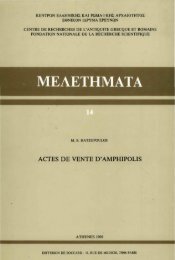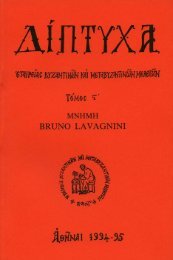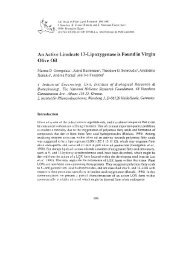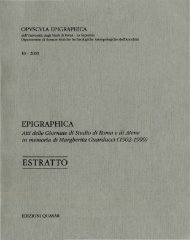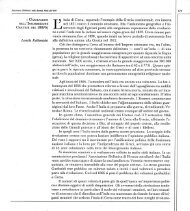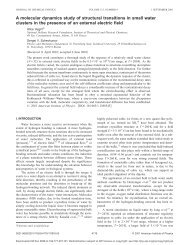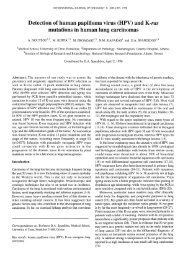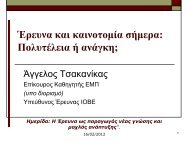- Page 1 and 2:
ÌUIVAIIIUAUUUHÌ'JI tili •m'. T
- Page 6 and 7:
Cover illustration: "L'Arcadie", Ν
- Page 8 and 9:
ΚΕΝΤΡΟΝ ΕΛΛΗΝΙΚΗΣ
- Page 10 and 11:
ι PATRAI: ancient city settlement
- Page 12 and 13:
ROMAN PELOPONNESE I bers' pre-exist
- Page 15 and 16:
TABLE OF CONTENTS PREFACE 9 ABBREVI
- Page 17 and 18:
LIST OF ABBREVIATIONS BullÉpigr Bu
- Page 19 and 20:
LIST OF ABBREVIATIONS Le Bas-Foucar
- Page 21 and 22:
LIST OF ABBREVIATIONS Rizakis, Acha
- Page 23 and 24:
SELECT BIBLIOGRAPHY Accame, S., Il
- Page 25 and 26:
SELECT BIBLIOGRAPHY Burnett, Α. M.
- Page 27 and 28:
SELECT BIBLIOGRAPHY Eck, W., "Die L
- Page 29 and 30:
SELECT BIBLIOGRAPHY Kaibel, G., Epi
- Page 31 and 32:
SELECT BIBLIOGRAPHY Martin, T. R.,
- Page 33 and 34:
SELECT BIBLIOGRAPHY Pariente, A. an
- Page 35 and 36:
SELECT BIBLIOGRAPHY — "Épigramme
- Page 37 and 38:
SELECT BIBLIOGRAPHY Stefanis, L, Α
- Page 39 and 40:
Α. GENERAL INTRODUCTION
- Page 41 and 42:
discoveries. Nor is it filled by th
- Page 43 and 44:
placed in the appendices given the
- Page 45 and 46:
ities. Discussion embraces the date
- Page 47 and 48:
και Κορινθίας", ΑΕ 19
- Page 49:
province d'Achaïe", in: O. Salomie
- Page 53 and 54:
CHAPTER I ROMAN PERSONAL NAMES IN A
- Page 55 and 56:
ROMAN PERSONAL NAMES IN ACHAIA cert
- Page 57 and 58:
ROMAN PERSONAL NAMES IN ACHAIA v.'.
- Page 59 and 60:
ROMAN PERSONAL NAMES IN ACHAIA 22.
- Page 61 and 62:
ROMAN PERSONAL NAMES IN ACHAIA is t
- Page 63 and 64:
ROMAN PERSONAL NAMES IN ACHAIA Patr
- Page 65 and 66:
ROMAN PERSONAL NAMES IN ACHAIA Rema
- Page 67 and 68:
57. L(UCIUS) CAECILIUS Rizakis, Ach
- Page 69 and 70:
ROMAN PERSONAL NAMES IN ACHAIA Aige
- Page 71 and 72:
ROMAN PERSONAL NAMES IN ACHAIA 73.
- Page 73 and 74:
erected by the named person: ΦύΙ
- Page 75 and 76:
ROMAN PERSONAL NAMES IN ACHAIA [lst
- Page 77 and 78:
107. FESTUS ROMAN PERSONAL NAMES IN
- Page 79 and 80:
118. Q(UINTUS) (FULVIUS) f. P(ubliu
- Page 81 and 82:
ROMAN PERSONAL NAMES IN ACHAIA 130.
- Page 83 and 84:
ROMAN PERSONAL NAMES IN ACHAIA Patr
- Page 85 and 86:
ROMAN PERSONAL NAMES IN ACHAIA 152.
- Page 87 and 88:
ROMAN PERSONAL NAMES IN ACHAIA 161-
- Page 89 and 90:
171. ΜΟΥΤΙΟΣ ROMAN PERSONAL
- Page 91 and 92:
182. L(UCIUS) (OPPIUS) Rizakis, Ach
- Page 93 and 94:
ROMAN PERSONAL NAMES IN ACHAIA Patr
- Page 95 and 96:
ROMAN PERSONAL NAMES IN ACHAIA i W
- Page 97 and 98:
ROMAN PERSONAL NAMES IN ACHAIA 210-
- Page 99 and 100:
218. ΣΟΣΙΟΣ Unpublished [impe
- Page 101 and 102:
229. Q(UINTUS) (TADIUS) Patron of T
- Page 103 and 104:
ROMAN PERSONAL NAMES IN ACHAIA 237.
- Page 105 and 106:
247. M(ARCUS) (VETULLUS) f. C(aius)
- Page 107 and 108:
(ACH 216) for himself and his wife
- Page 109 and 110:
ROMAN PERSONAL NAMES IN ACHAIA 270.
- Page 111 and 112:
CHAPTER II ROMAN PERSONAL NAMES IN
- Page 113 and 114:
ROMAN PERSONAL NAMES IN ARCADIA the
- Page 115 and 116:
11. ΑΣΙΝΝΙΑ MAMMIA IG V 1, 4
- Page 117 and 118:
ROMAN PERSONAL NAMES IN ARCADIA an
- Page 119 and 120:
ROMAN PERSONAL NAMES IN ARCADIA 2,
- Page 121 and 122:
ROMAN PERSONAL NAMES IN ARCADIA IG
- Page 123 and 124:
ROMAN PERSONAL NAMES IN ARCADIA Kle
- Page 125 and 126:
58. TIB(EPIA) ΚΑΑΥΔΙΑ IOYAIT
- Page 127 and 128:
ROMAN PERSONAL NAMES IN ARCADIA Kyn
- Page 129 and 130:
72. ΚΑΑΥΑΙΟΣ ΣΥΜΦΟΡΟ
- Page 131 and 132:
83. ΕΕΛΛΙΟΣ ΒΑΣΣΟΣ ROM
- Page 133 and 134:
ROMAN PERSONAL NAMES IN ARCADIA 90.
- Page 135 and 136:
99. ΕΑΪΟΣ ΙΟΥΛΙΟΣ ΛΑ
- Page 137 and 138:
ROMAN PERSONAL NAMES IN ARCADIA Her
- Page 139 and 140:
attested as father of one of the ep
- Page 141 and 142:
ROMAN PERSONAL NAMES IN ARCADIA fac
- Page 143 and 144:
ROMAN PERSONAL NAMES IN ARCADIA λ
- Page 145 and 146:
ROMAN PERSONAL NAMES IN ARCADIA 140
- Page 147 and 148:
150. ΣΕΚΟΥΝΑΟΣ ROMAN PERSO
- Page 149 and 150:
father of the ephebe Ζώσιμος
- Page 151 and 152:
ROMAN PERSONAL NAMES IN ARCADIA 167
- Page 153:
ROMAN PERSONAL NAMES IN ARCADIA 175
- Page 156 and 157:
ROMAN PELOPONNESE I and 294, no. 51
- Page 158 and 159:
ROMAN PELOPONNESE I Remarks: Accord
- Page 160 and 161:
ROMAN PELOPONNESE I 16-17, no. 21 [
- Page 162 and 163:
ROMAN PELOPONNESE I Argos; a grave
- Page 164 and 165:
ROMAN PELOPONNESE I 33. AYP(HAIA) T
- Page 166 and 167:
ROMAN PELOPONNESE I 42. ΑΥΡ(ΗΑ
- Page 168 and 169:
ROMAN PELOPONNESE I *49. Μ(ΑΡΚ
- Page 170 and 171:
ROMAN PELOPONNESE I [Α]ύρ(ήλι
- Page 172 and 173:
61-65 ROMAN PELOPONNESE I 61. ΑΥ
- Page 174 and 175:
ROMAN PELOPONNESE I Epidauros, sanc
- Page 176 and 177:
ROMAN PELOPONNESE I Argos; a plaque
- Page 178 and 179:
ROMAN PELOPONNESE I [lst/2ndc. A.D.
- Page 180 and 181:
ROMAN PELOPONNESE I *90. ΓΠΒ(Ε
- Page 182 and 183:
ROMAN PELOPONNESE I 1974, 610; 1980
- Page 184 and 185:
ROMAN PELOPONNESE I [2] IG IV 1154;
- Page 186 and 187:
ROMAN PELOPONNESE I AnnÉpigr 1994,
- Page 188 and 189:
111-114 ROMAN PELOPONNESE I 111. Λ
- Page 190 and 191:
ROMAN PELOPONNESE I [2] IG IV 1432;
- Page 192 and 193:
ROMAN PELOPONNESE I erected for the
- Page 194 and 195:
127-131 ROMAN PELOPONNESE I 127. Φ
- Page 196 and 197:
135. ΗΡΑΚΛΙΑΝΟΣ ROMAN PEL
- Page 198 and 199:
141-142 ROMAN PELOPONNESE I The chr
- Page 200 and 201:
ROMAN PELOPONNESE I [Γάιον] Ί
- Page 202 and 203:
ROMAN PELOPONNESE I ύδρ]Ιορο
- Page 204 and 205:
ROMAN PELOPONNESE I Ά πόλις
- Page 206 and 207:
ROMAN PELOPONNESE I Beamtennamen au
- Page 208 and 209:
ROMAN PELOPONNESE I Hermione; an ho
- Page 210 and 211:
ROMAN PELOPONNESE I Argos; a biling
- Page 212 and 213:
ROMAN PELOPONNESE I Remarks: Cf. th
- Page 214 and 215:
ROMAN PELOPONNESE I Peek, loc. cit.
- Page 216 and 217:
ROMAN PELOPONNESE I Argos, agora; f
- Page 218 and 219:
ROMAN PELOPONNESE I Remarks: For th
- Page 220 and 221:
ROMAN PELOPONNESE I Argos; an honor
- Page 222 and 223:
ROMAN PELOPONNESE I Remarks: It is
- Page 224 and 225:
216-219 ROMAN PELOPONNESE I probabl
- Page 226 and 227:
ROMAN PELOPONNESE I Epidauros, sanc
- Page 228 and 229:
ROMAN PELOPONNESE I 232. ΤΙΒ(Ε
- Page 230 and 231:
240. ΣΕΞΤΟΣ ROMAN PELOPONNESE
- Page 232 and 233:
ROMAN PELOPONNESE I Α πόλις
- Page 234 and 235:
ROMAN PELOPONNESE I 246. Τ(ΙΤΟ
- Page 236 and 237:
ROMAN PELOPONNESE I [2] IG IV 1139;
- Page 238 and 239:
ROMAN PELOPONNESE I Epidauros, sanc
- Page 240 and 241:
ROMAN PELOPONNESE I Troizen, an hon
- Page 242 and 243:
ROMAN PELOPONNESE I 262. ΟΥΕΣΠ
- Page 244 and 245:
ROMAN PELOPONNESE I regency and soj
- Page 246 and 247:
272. ΔΟΥΚΙΟΣ ROMAN PELOPONNE
- Page 249 and 250:
A[- - -]: see COR 657 1. [- - -] AB
- Page 251 and 252:
ROMAN PERSONAL NAMES IN CORINTHIA 8
- Page 253 and 254:
14. ΑΙΛΙΟΣ ΔΙΟΣΚΟΡΟΣ
- Page 255 and 256:
[im]peratori[s Titi Caesaris di]vi
- Page 257 and 258:
30. ΑΝΤΙΣΤΙΟΣ ΜΑΞΙΜ[
- Page 259 and 260:
40. Ç(AIUS) (ANTONIUS) f. of Anton
- Page 261 and 262:
ROMAN PERSONAL NAMES IN CORINTHIA 5
- Page 263 and 264:
ROMAN PERSONAL NAMES IN CORINTHIA d
- Page 265 and 266:
ROMAN PERSONAL NAMES IN CORINTHIA s
- Page 267 and 268:
299,1. 6, pl. 8 [A.D. 137]. ROMAN P
- Page 269 and 270:
1. 7, pl. 8 [A.D. 137]. ROMAN PERSO
- Page 271 and 272:
ROMAN PERSONAL NAMES IN CORINTHIA a
- Page 273 and 274:
98. ΑΥΡΗΑΙΑΝΟΣ IG IV, 404
- Page 275 and 276:
ROMAN PERSONAL NAMES IN CORINTHIA m
- Page 277 and 278:
112. [- - - BA]BBIUS [. F. QUI]R(IN
- Page 279 and 280:
122. CAESENNIA LAI S CIL III. 7273
- Page 281 and 282:
ROMAN PERSONAL NAMES IN CORINTHIA 1
- Page 283 and 284:
ROMAN PERSONAL NAMES IN CORINTHIA 1
- Page 285 and 286:
ROMAN PERSONAL NAMES IN CORINTHIA 1
- Page 287 and 288:
of his name. Cnidiaius 156. [.] (CL
- Page 289 and 290:
ROMAN PERSONAL NAMES IN CORINTHIA 1
- Page 291 and 292:
ROMAN PERSONAL NAMES IN CORINTHIA T
- Page 293 and 294:
ROMAN PERSONAL NAMES IN CORINTHIA 1
- Page 295 and 296:
ROMAN PERSONAL NAMES IN CORINTHIA 1
- Page 297 and 298:
ROMAN PERSONAL NAMES IN CORINTHIA 1
- Page 299 and 300:
ROMAN PERSONAL NAMES IN CORINTHIA 2
- Page 301 and 302:
ROMAN PERSONAL NAMES IN CORINTHIA 2
- Page 303 and 304:
ROMAN PERSONAL NAMES IN CORINTHIA "
- Page 305 and 306:
ROMAN PERSONAL NAMES IN CORINTHIA ^
- Page 307 and 308:
ROMAN PERSONAL NAMES IN CORINTHIA 2
- Page 309 and 310:
ROMAN PERSONAL NAMES IN CORINTHIA 2
- Page 311 and 312:
Theodora: ROMAN PERSONAL NAMES IN C
- Page 313 and 314:
ROMAN PERSONAL NAMES IN CORINTHIA (
- Page 315 and 316:
ROMAN PERSONAL NAMES IN CORINTHIA 2
- Page 317 and 318:
ROMAN PERSONAL NAMES IN CORINTHIA 2
- Page 319 and 320:
ROMAN PERSONAL NAMES IN CORINTHIA R
- Page 321 and 322:
ROMAN PERSONAL NAMES IN CORINTHIA 2
- Page 323 and 324:
ROMAN PERSONAL NAMES IN CORINTHIA C
- Page 325 and 326:
ROMAN PERSONAL NAMES IN CORINTHIA 2
- Page 327 and 328:
ROMAN PERSONAL NAMES IN CORINTHIA 2
- Page 329 and 330:
ROMAN PERSONAL NAMES IN CORINTHIA 3
- Page 331 and 332:
ROMAN PERSONAL NAMES IN CORINTHIA t
- Page 333 and 334:
ROMAN PERSONAL NAMES IN CORINTHIA 3
- Page 335 and 336:
331. C(AIUS) IU[LIUS - - -] Corinth
- Page 337 and 338:
ROMAN PERSONAL NAMES IN CORINTHIA I
- Page 339 and 340:
ROMAN PERSONAL NAMES IN CORINTHIA C
- Page 341 and 342:
he was victor in the συνωρίς
- Page 343 and 344:
ROMAN PERSONAL NAMES IN CORINTHIA 3
- Page 345 and 346:
ROMAN PERSONAL NAMES IN CORINTHIA 3
- Page 347 and 348:
ROMAN PERSONAL NAMES IN CORINTHIA I
- Page 349 and 350:
ROMAN PERSONAL NAMES IN CORINTHIA 3
- Page 351 and 352:
ROMAN PERSONAL NAMES IN CORINTHIA 3
- Page 353 and 354:
409. ΜΑΡΙΝΟΣ Corinth VIII. 1
- Page 355 and 356:
ROMAN PERSONAL NAMES IN CORINTHIA ^
- Page 357 and 358:
426. CN(AEUS) [- - -] MOSC[HUS] Cor
- Page 359 and 360:
[- - -] et L. Numerous —]l [— p
- Page 361 and 362:
ROMAN PERSONAL NAMES IN CORINTHIA 4
- Page 363 and 364:
ROMAN PERSONAL NAMES IN CORINTHIA 4
- Page 365 and 366:
ROMAN PERSONAL NAMES IN CORINTHIA C
- Page 367 and 368:
475. C(AIUS) PINNIUS Amandry 130-13
- Page 369 and 370:
ROMAN PERSONAL NAMES IN CORINTHIA 4
- Page 371 and 372:
494. [- - -] [PRO]ÇLUS Corinth Vil
- Page 373 and 374:
ROMAN PERSONAL NAMES IN CORINTHIA 5
- Page 375 and 376:
ROMAN PERSONAL NAMES IN CORINTHIA o
- Page 377 and 378:
ROMAN PERSONAL NAMES IN CORINTHIA 1
- Page 379 and 380:
1. I ex testamento. ROMAN PERSONAL
- Page 381 and 382:
ROMAN PERSONAL NAMES IN CORÌNTHIA
- Page 383 and 384:
ROMAN PERSONAL NAMES IN CORINTHIA 5
- Page 385 and 386:
567. [- - - ΣΕΙΡΒΙΑΙΟΣ OM
- Page 387 and 388:
ROMAN PERSONAL NAMES IN CORINTHIA o
- Page 389 and 390:
*586. THEOPREPES Aug. lib. CIL III.
- Page 391 and 392:
597. L(UCIUS) (VALERIUS) f. of [L(u
- Page 393 and 394:
ROMAN PERSONAL NAMES IN CORINTHIA 6
- Page 395 and 396:
619. T(ITUS) VERGILIUS C. F. AEM(IL
- Page 397 and 398:
ROMAN PERSONAL NAMES IN CORINTHIA C
- Page 399 and 400:
Vibullii PU, etc. ROMAN PERSONAL NA
- Page 401 and 402:
ROMAN PERSONAL NAMES IN CORINTHIA 6
- Page 403 and 404:
ROMAN PERSONAL NAMES IN CORINTHIA 6
- Page 405 and 406:
671. [- - -]INA Corinth VIII. 3, 17
- Page 407 and 408:
ROMAN PERSONAL NAMES IN CORINTHIA 6
- Page 409 and 410: [3] Corinth IV. 2, 745, pi. XXXI [2
- Page 411 and 412: [5] Isthmia III, 2858, pi. 11 [2nd
- Page 413: ROMAN PERSONAL NAMES IN CORINTHIA [
- Page 416 and 417: ROMAN PELOPONNESE I and 225), who b
- Page 418 and 419: ROMAN PELOPONNESE I names of some O
- Page 420 and 421: 16-17 ROMAN PELOPONNESE I of Macedo
- Page 422 and 423: ROMAN PELOPONNESE I Olympia; a stat
- Page 424 and 425: ROMAN PELOPONNESE I Olympia; a base
- Page 426 and 427: ROMAN PELOPONNESE I Olympia; a frag
- Page 428 and 429: ROMAN PELOPONNESE I Remarks: The co
- Page 430 and 431: ROMAN PELOPONNESE I Remarks: It is
- Page 432 and 433: 50-51 ROMAN PELOPONNESE I Remarks:
- Page 434 and 435: 55. ΑΚΥΑΑΣ [A]KYAA ROMAN PELO
- Page 436 and 437: ROMAN PELOPONNESE I Olympia; list o
- Page 438 and 439: ROMAN PELOPONNESE I 65. ΑΥΡ(ΗΔ
- Page 440 and 441: ROMAN PELOPONNESE I 75. ΑΥΡ(ΗΔ
- Page 442 and 443: ROMAN PELOPONNESE I [3] IvO 112,1.
- Page 444 and 445: ROMAN PELOPONNESE I From Antioch on
- Page 446 and 447: ROMAN PELOPONNESE I *97. ΚΟΪΝΤ
- Page 448 and 449: ROMAN PELOPONNESE I Remarks: Candid
- Page 450 and 451: llla-113 ROMAN PELOPONNESE I Olympi
- Page 452 and 453: ROMAN PELOPONNESE I Olympia; a stat
- Page 454 and 455: ROMAN PELOPONNESE I 122. [Κ]ΑΑΥ
- Page 456 and 457: ROMAN PELOPONNESE I the person disc
- Page 458 and 459: ROMAN PELOPONNESE I acquired Roman
- Page 462 and 463: ROMAN PELOPONNESE I "Αππίου]
- Page 464 and 465: ROMAN PELOPONNESE I and the descend
- Page 466 and 467: ROMAN PELOPONNESE I but there is on
- Page 468 and 469: ROMAN PELOPONNESE I Olympia; list o
- Page 470 and 471: ROMAN PELOPONNESE I Recherches sur
- Page 472 and 473: 161-162 ROMAN PELOPONNESE I 118) an
- Page 474 and 475: ROMAN PELOPONNESE I Cassia, whose a
- Page 476 and 477: ROMAN PELOPONNESE I *167. Λ(ΟΥΚ
- Page 478 and 479: ROMAN PELOPONNESE I Olympia; list o
- Page 480 and 481: ROMAN PELOPONNESE I 122 B.C. (Broug
- Page 482 and 483: ROMAN PELOPONNESE I 183. [Φ]ΑΥΣ
- Page 484 and 485: ROMAN PELOPONNESE I the ornamenta p
- Page 486 and 487: ROMAN PELOPONNESE I [2] JvO 467 fac
- Page 488 and 489: ROMAN PELOPONNESE I with the consen
- Page 490 and 491: 214-215 ROMAN PELOPONNESE I Partum"
- Page 492 and 493: ROMAN PELOPONNESE I Φούφ(ιος
- Page 494 and 495: ROMAN PELOPONNESE I άγοραΙ[ν
- Page 496 and 497: ROMAN PELOPONNESE I 234. ΙΟΥΛΙ
- Page 498 and 499: ROMAN PELOPONNESE I τε οι πα
- Page 500 and 501: ROMAN PELOPONNESE I *249. Λ(ΕΥΚ
- Page 502 and 503: ROMAN PELOPONNESE I ' Olympia; list
- Page 504 and 505: ROMAN PELOPONNESE I 264. ΜΑΡΚΟ
- Page 506 and 507: theocolos ROMAN PELOPONNESE I Remar
- Page 508 and 509: *280. ΜΟΛ[ΕΣΤΟΣ] ROMAN PELO
- Page 510 and 511:
ROMAN PELOPONNESE I monuments see H
- Page 512 and 513:
ROMAN PELOPONNESE I Ή πόλις
- Page 514 and 515:
ROMAN PELOPONNESE I [2] IvO 442 fac
- Page 516 and 517:
ROMAN PELOPONNESE I Remarks: The fi
- Page 518 and 519:
313 ROMAN PELOPONNESE I Olympia; li
- Page 520 and 521:
ROMAN PELOPONNESE I identifies him
- Page 522 and 523:
ROMAN PELOPONNESE I 8 [Athens 1988]
- Page 524 and 525:
ROMAN PELOPONNESE I Suppl. XIV (197
- Page 526 and 527:
ROMAN PELOPONNESE I alytarches [2],
- Page 528 and 529:
ROMAN PELOPONNESE I Atticus II, 140
- Page 530 and 531:
ROMAN PELOPONNESE I APPENDIX: LAMPS
- Page 532 and 533:
STEMMA II ROMAN PELOPONNESE I S. Zo
- Page 534 and 535:
STEMMA V ROMAN PELOPONNESE I A.J.S.
- Page 536 and 537:
STEMMA Vili ROMAN PELOPONNESE I J.H
- Page 538 and 539:
XI, 2 ROMAN PELOPONNESE I X < r» s
- Page 540 and 541:
XII ROMAN PELOPONNESE I STEMMA XII
- Page 542 and 543:
STEMMA XV ROMAN PELOPONNESE I Zoumb
- Page 544 and 545:
STEMMA XVIII ROMAN PELOPONNESE I Zo
- Page 547 and 548:
I. ROMAN PERSONAL NAMES OF MEN AND
- Page 549 and 550:
INDEX I: ROMAN PERSONAL NAMES OF ME
- Page 551 and 552:
INDEX I: ROMAN PERSONAL NAMES OF ME
- Page 553 and 554:
INDEX I: ROMAN PERSONAL NAMES OF ME
- Page 555 and 556:
INDEX I: ROMAN PERSONAL NAMES OF ME
- Page 557 and 558:
Πισανός, 299 Callistus/Κά
- Page 559 and 560:
INDEX I: ROMAN PERSONAL NAMES OF ME
- Page 561 and 562:
INDEX I: ROMAN PERSONAL NAMES OF ME
- Page 563 and 564:
Crotonensis COR: *P[ublius] Calpu[r
- Page 565 and 566:
Ευδία ARC: 'Ιουλία Ευ
- Page 567 and 568:
Φλώρος, 336 [1]; Λουκίο
- Page 569 and 570:
EL: M. Helvius Geminus, 223 adn. He
- Page 571 and 572:
INDEX I: ROMAN PERSONAL NAMES OF ME
- Page 573 and 574:
INDEX I: ROMAN PERSONAL NAMES OF ME
- Page 575 and 576:
INDEX I: ROMAN PERSONAL NAMES OF ME
- Page 577 and 578:
INDEX I: ROMAN PERSONAL NAMES OF ME
- Page 579 and 580:
P[- - -] COR: Γ(άιος) Άβίδ
- Page 581 and 582:
INDEX I: ROMAN PERSONAL NAMES OF ME
- Page 583 and 584:
INDEX I: ROMAN PERSONAL NAMES OF ME
- Page 585 and 586:
INDEX I: ROMAN PERSONAL NAMES OF ME
- Page 587 and 588:
Σεπτίμιος INDEX I: ROMAN P
- Page 589 and 590:
Σύμφορος ARC: Κλαύδι
- Page 591 and 592:
Tuditanus EL: Tuditanus, 320 adn.
- Page 593 and 594:
INDEX I: ROMAN PERSONAL NAMES OF ME
- Page 595 and 596:
A[- - -]: ACH: M(arcus) A[- - -] Pr
- Page 597 and 598:
[Μ(άρκος) Ά]ντώνιος
- Page 599 and 600:
Autronius: Autron [ius —] COR 105
- Page 601 and 602:
Ηρώδης 'Αττικός, 174;
- Page 603 and 604:
Κρισπεινος, 108 ARC: Φλ
- Page 605 and 606:
[Τιβ(έριος) 'Ιούλιος
- Page 607 and 608:
Munatius: [L(ucius) Munatius M. f.
- Page 609 and 610:
Cn. Publil[ius] Re[gulus], 508 adn.
- Page 611 and 612:
Varronia: Varronia Vera ACH 238 Var
- Page 613 and 614:
A[—]: Μ(άρκος) Αύρ(ήλ
- Page 615 and 616:
Ά[σι]ατικός: [Γάι]ος
- Page 617 and 618:
Cor[- - -]: M(arcus) Fu[lvius- - -
- Page 619 and 620:
L(ucius) Marius Floras Stiacciarne
- Page 621 and 622:
Λατίνος: [—] Λατίνο
- Page 623 and 624:
Νικήρατος EL 157 Νικό
- Page 625 and 626:
Ποθοΰσα: Ιουλία Ποθ
- Page 627 and 628:
Saturnina: [—]ia Saturni [na] COR
- Page 629 and 630:
Θεοφάνης: *[Μ(άρκος)]
- Page 631 and 632:
Antiochian: COR 19 Antinoian/ Άν
- Page 633 and 634:
Ragia Trias: see Merbaka Hagios And
- Page 635 and 636:
PHLIUS: COR 334, 553 Phocian (Φω
- Page 637 and 638:
άλ(λ)υτάρχης: EL 136, 155
- Page 639 and 640:
INDEX V: SELECT INDEX OF GREEK AND
- Page 641 and 642:
325; see also πρεσβευτής
- Page 643 and 644:
INDEX V: SELECT INDEX OF GREEK AND
- Page 645:
στρατηγός ύπατος Τ
- Page 652:
vb/'l'/.'^'/O- ,ιΙ'////'/?Α / '/




